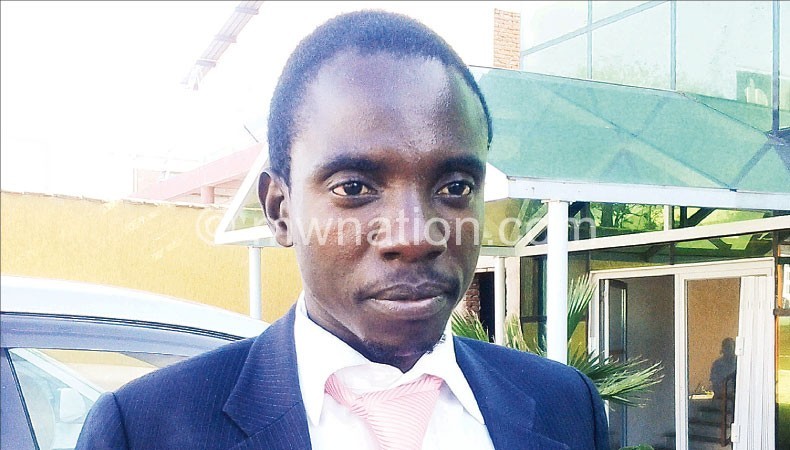‘LAW DOES NOT TALK ABOUT PUBLIC, CIVIL SERVICE’

The Malawi Electoral Commission (MEC) three weeks ago barred president of Umodzi Party (UP) John Chisi from contesting in the May 20 Tripartite Elections on the pretext that he is still a public officer under the University of Malawi (Unima). Just two weeks ago, again, MEC rejected the parliamentary candidature of Malawi Congress Party (MCP) spokesperson Jessie Kabwila on similar grounds, yet almost seven parliamentary aspirants of the ruling People’s Party (PP) were given a go-ahead to contest. The seven are serving at the State House which is a public office. Chisi and Kabwila respectively are seeking legal redress on the matter. These developments have culminated in a public debate on whether presidential advisers are public servants or not. GEORGE MHANGO speaks to Chancellor College labour law expert Mauya Msuku on what constitutes a public servant and civil servant.
Q:
In view of the current debate, can you elaborate the difference between a public servant and a civil servant?
A:
Ordinarily civil servants, refer to those employees of government within the mainstream government. Those with predetermined mode of appointment, promotions, etc. others have even argued that civil servants are those whose appointments are based on merit. They are usually referred to as being within the ranks of beaurocrats. On the other hand of public service is broad. It includes all those employed or appointed into government or government-affiliated bodies. It includes appointments. So, public service is broader than civil service and civil service is part of public service.
Q:
In this case, to which category do presidential advisers belong?
A:
As regards presidential advisers, they may not fall within civil services, but they certainly fall within public service. What is critical however, is that Section 51 of the Constitution, does not talk of civil service but public service which certainly, includes advisers.
Q:
Can the fact that one’s contract is different from others in the public service exonerate presidential advisers?
A:
Mode of appointment does not matter. In fact, Section 51 talks of a person who “holds or acts in any public office or appointment….” The wording is the same as regards provision on presidential qualifications. This itself demonstrates that the mode of contract may not matter.
Q:
Legally, what are your views on MEC’s disqualification of John Chisi and Jessie Kabwila, both of whom are said to be on a leave of absence, from the May 20 race on the basis that they are public officers?
A:
My personal view is that leave does not terminate employment relationship. If I am a teacher, I am still a teacher even if I am on leave. Legally, when computing my terminal benefits, the period I am on leave ought to be included. This, of course, may be subject to provisions of a specific contract. The answer may therefore, be incomplete unless one sees the contracts of the persons involved. But as a general rule, leave does not suspend employment relationship. As regards the question whether the two are public servants, certainly they are. There may be argument whether they are civil servants. But as regards public servants, they certainly are.
Q:
How best could MEC have handled the matter, considering that other aspirants, who are also public or civil servants, particularly those belonging to the ruling party, have not been disqualified?
A:
If two people are in the same position, they ought to be treated equally unless there is some good reason. That is the essence of equality as guaranteed under Section 20 of the Constitution. However, since law, by its very nature is subject to interpretation, MEC may, therefore have a different interpretation before reaching the conclusions. Since, constitutionally, it is the court whose interpretation is authoritative, all we can give are merely opinions. It is, therefore, open to the affected parties to seek court intervention for final interpretation.
Q:
Is MEC an institution that we should trust to administer our elections if they cannot be neutral now?
A:
As said, it may not be fair to fault MEC outright. Opinions are bound to differ. We cannot, therefore, distrust MEC on an account of a single decision. The people disqualified did not hold the same office as those qualified. As such, there may be differences in understanding of the application of the law. This should not be a ground of distrust. As said, aggrieved parties can seek court intervention. From what I gather, this seems to have already been done.
Q:
What are the implications of MEC’s decision?
A:
In very simple terms, the effects of MEC’s decision are that those disqualified will not stand unless the decision is otherwise reversed or set aside.
Q:
Does this scenario indicate that our labour laws are weak?
A:
I don’t think this in any way indicates weakness in our labour laws. The issue at hand is more of a constitutional law rather than labour law. Labour law is not worried much with whether one is a public servant or civil servant. In fact, if one focuses on laws governing labour relations, the focus is more on who is an employee in which case whether one is a public servant or civil servant, may have less effect. The problem we have is therefore, not a labour law but a constitutional law problem. If at all there is a problem.
Q:
What is the solution to this challenge?
A:
In my view, there is no problem here. As said earlier, law by its very nature is subject to interpretation. That is the order of the day and that what keeps lawyers going. All that is needed, therefore, is to ask the authoritative interpreter, who is the court’s to give meaning to the provision.
Q:
Any last remarks?
A:
The only problem I see here is conditional application of the law. In the past, university lecturers have been allowed to contest without a challenge. It is this lack of consistency that is a problem to me.





